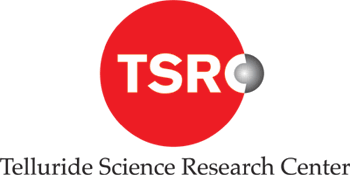
13 Jul TSRC’s Town Talks: Molecular Science As It’s Happening Now
 Nonequilibrium phenomena, biomagnetic particles, thermal transport, quantum trajectories, phrases like those reverberate through the halls of Telluride Science Research Center (TSRC). For the majority of the public, they are perplexing or intimidating “sciency” words, but for scientists, they are the foundational theories that solve bigger scientific dilemmas.
Nonequilibrium phenomena, biomagnetic particles, thermal transport, quantum trajectories, phrases like those reverberate through the halls of Telluride Science Research Center (TSRC). For the majority of the public, they are perplexing or intimidating “sciency” words, but for scientists, they are the foundational theories that solve bigger scientific dilemmas.
“TSRC workshops certainly don’t have ‘sexy’ titles, but there’s a reason why,” said Jack Simons, Professor Emeritus of Chemistry at The University of Utah, “They are focused on the tools and concepts that underpin molecular science that are needed to address big-picture issues.”
TSRC presents the fifth 20 x 20 Town Talk of the summer on Tuesday, July 16, 6 p.m. at the Historic Sheridan Opera House (110 N. Oak St.). Simons hits close to home with “Molecular Science Education at Telluride: Helping America Keep its Stature.” Ken Jordan, Distinguished Professor of Computational Chemistry at University of Pittsburgh and former TSRC President, presents “Science vs. Pseudoscience.”
“Molecular” defines TSRC. “If you take a look at TSRC’s long history of workshops, you can say that’s sort of chemistry, or biology, or physics,” said Simons. “What it really all falls under is molecular science.”
Interactions between molecules are all around us, and TSRC’s workshops and schools are geared toward facilitating creative, unique alliances among scientists that will drive molecular discoveries forward.
“Nanotubes, photovoltaic materials, drugs, atmospheric gases, clean energy, these are all based on molecular interactions,” explained Simons.
In his talk, Simons will explore just how ubiquitous molecular science is, while describing the larger problems TSRC’s diverse workshops are tackling.
Simons also established the Telluride School on Theoretical Chemistry in 2008. This biennial school welcomes doctoral students to expand their research beyond academic coursework and is the only school of its kind in the United States.
Jordan is focused on a new way of thinking about solving problems.
“I believe the most important thing we should be teaching at all levels of education is critical information – how to filter conflicting claims and reach a conclusion,” he said.
Jordan’s talk will expose many fallacies surrounding science, with a particular focus on water. For example, homeopathy (water having memory), clustered water, and saltwater are examples of scientific claims that violate the laws of thermodynamics.
“We live in a world with massive amounts of information and misinformation. We need to be able to filter out the false claims,” said Jordan.
Jordan is a strong proponent of critical thinking. To prevent scientific hoaxes from parading around in our society as facts and truths, there should be more scientific awareness and revisions in the way society teaches science, Jordan says. On Tuesday, he will discuss thought processes that we might use to arrive at logical conclusions, amidst an overwhelming amount of pretense.
The underlying message behind both Simons’ and Jordan’s talks is the need for continued scientific education that expands beyond the textbook.
“About 80% of the population cannot even name one living scientist,” remarked Jordan. “Very different from asking them to name a movie star or professional athlete.”
For more information about this Tuesday’s Town Talk visit telluridescience.org.


Sorry, the comment form is closed at this time.